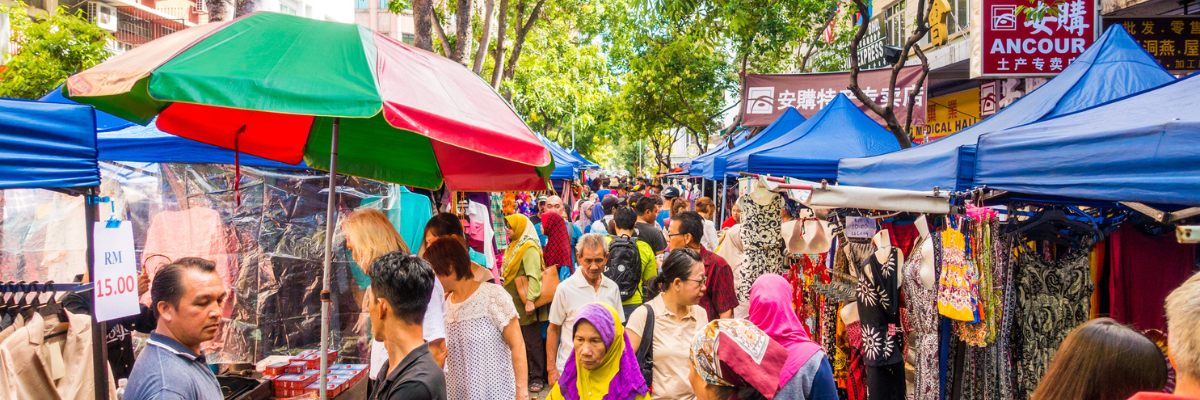Destination

Kota Kinabalu, also known as KK, is the capital of Malaysia’s Sabah state. Located on the island of Borneo, Kota Kinabalu is known for its beautiful beaches, rich culture, bustling markets, and stunning natural surroundings. The city is a gateway to the UNESCO World Heritage Site, Mount Kinabalu, which is the highest mountain in Southeast Asia, sitting at 4,095m within the Kinabalu National Park. With its friendly locals and unique blend of city and nature, Kota Kinabalu is a must-visit destination in Malaysia.
The currency of Kota Kinabalu is the Malaysian Ringgit (RM). One Ringgit is divided into 100 sen. Banknotes come in denominations of RM1, RM5, RM10, RM20, RM50, and RM100, while coins come in denominations of 1 sen, 5 sen, 10 sen, 20 sen, and 50 sen. The Ringgit is not freely exchangeable, so you will need to purchase it through authorised dealers or banks. You can also use credit cards in Kota Kinabalu, but it is always a good idea to have some cash on hand in case you need it.
The climate of Kota Kinabalu is tropical and humid. The weather in June can be somewhat unpredictable, as it is a transition month between the dry and wet seasons. However, it is generally warm and humid, seeing temperatures around 26-32°C. Kota Kinabalu is located close to the equator, so it experiences a lot of sunshine, however it is still possible to experience some wet weather in June.
Kota Kinabalu is a great place to shop, with a wide range of options catering to all budgets and tastes. There are a number of modern shopping centres (e.g. 1Borneo Hypermall – the largest mall in Sabah, or the Suria Sabah Shopping Mall), or for a more traditional shopping experience you could visit a local market (e.g. the Pasar Filipina market or the Gaya Street Sunday Market, both popular for souvenirs and handicrafts). There are also plenty of street stalls and vendors where you can find everything from clothes and accessories to local snacks, and you can try to bargain for the best price.
Kota Kinabalu is known for its delicious and diverse food and drink options. The city has a wide range of restaurants and cafes serving local and international cuisine, as well as street food stalls and markets offering traditional Malay dishes. Some popular local dishes in Kota Kinabalu include nasi goreng (fried rice), satay (grilled meat skewers), and laksa (spicy noodle soup). Seafood is also a staple in the city, with a variety of fresh fish and shellfish available at local markets and restaurants.
When it comes to drink, the city is known for its coconut water, which is a refreshing and hydrating drink that is widely available. Tea and coffee are also popular. Kota Kinabalu also has a variety of bars and clubs serving alcoholic drinks, including local and international beers, wines, and spirits.
The official language is Malay, which is spoken by the majority of the population. English is also widely spoken and is the main language of business and education. Kota Kinabalu is known for its diverse culture and mix of languages, with a number of other languages spoken such as Chinese dialects including Mandarin, Hokkien and Cantonese, and indigenous languages such as Kadazan and Murut. It is relatively easy to communicate in Kota Kinabalu even if you do not speak Malay or one of the other local languages.
The standard electrical voltage in Kota Kinabalu is 240 volts and the frequency is 50 Hz. Malaysia uses Type G outlets, which have three rectangular prongs arranged in a triangle shape. This is the same as UK.
A 9% Government Value Added Tax (VAT) is applicable to all goods and services in Fiji. Hotels and resorts charge a Service Turnover Tax of 6% and an Environment and Climate Adaptation Levy of 10%.
There are many ways for getting around in the city for tourists in Kota Kinabalu which includes public as well as private transport. Though public transport is in a nascent stage in almost all the parts of Sabah, yet their availability and frequency is fine.
Taxis
KK is packed with thousands of private taxis. Besides their easy availability, another good thing about these taxis is that they are affordable as well. Especially when someone is in hurry, taking one of these taxis rather than waiting for a public transport bus would be a wise decision. Following are the few things about taxis knowing which shall be good for travelers since these are the most used mode of transport by vacationers in KK:
- A taxi in KK has ‘Teksi’ sign on its roof. Normally they are white-on-red but nowadays can be found in other colors too.
- Most taxi drivers are reluctant about following regulations with regards to fares. However, short rides are charged around RM10 and little longer ones around RM20. Hiring a taxi for an entire day should cost somewhere around RM300.
- Fares can be negotiated.
- Rides to and from the airport are charged at fixed prices.
- In case there is an argument with the taxi driver, making a call to the authorities is of a good help.
More information on public transport is available here.
Tipping is not a common practice is Kota Kinabalu, and is not expected in most places. It is however ultimately up to you to decide if you want to leave a tip or not, and with tipping becoming more common in the service industry, especially in hotels, restaurants and bars, if you receive good service and want to leave a tip, a small amount such as 10-15% of the bill is generally accepted.
